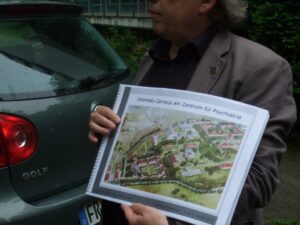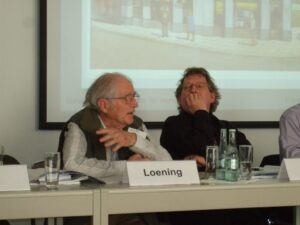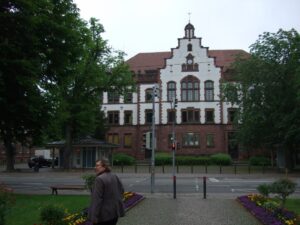In our last newsletter, CHE Director Emeritus Ulrich Loening reported on plans for a new European Centre for Human Ecology. In case you missed it, here’s what he had to say, along with some photographs he took of his visit:
The German Society for Human Ecology has for a few years been discussing the possibilities of founding a European College of Human Ecology. Over the past two years this has developed into a fully formulated plan. I had not attended any of the annual meetings of the Society, but last June I joined them for a workshop in Frankfurt.

We met first in the southern town of Emmendingen, where the Mayor and many citizens had welcomed the idea. We examined several sites which had been identified for the College. Outside the town is an organic farm around ancient historically interesting buildings, with scope to take over some buildings and build some new ones. Nearer into town is a large parkland area which is a psychiatric hospital, now reducing its local needs. It has beautiful trees, many buildings, also with scope to take on old and build new.

Then right in the centre of town is an old school building and the decaying old Town Hall. Both would need extensive renovation. Also a steel factory, founded about 1860, still run by a descendant of the founding family. He runs it on a sustainable basis, not geared to maximum growth, and offered a lot of space.

These options each have attractive features and question the philosophical basis of what we are trying to achieve. It might be lovely on the organic farm, yet that is not the real modern world. The other extreme would be in the heart of modern industry, facing up to our global problematique. We worked through these options next day in the heart of Frankfurt, among all those financial monster buildings. The whole idea follows the College of the Atlantic, whose founding and present Deans were present, and is based on the liberal arts colleges of the USA. German universities are suffering like ours in UK, except, it seems more so. Liberal subjects like sociology are more or less dead. The possibilities for human ecological thinking and teaching have practically vanished. So the new College would provide the base for a liberal education. I had suggested, from our own experience and that of the now closed Brussels course, that a post-graduate course would be better; but the educational needs really indicated an undergraduate course of 3 or 4 years. Like ourselves and the CoA who sought us out so many years ago, the new project is keen to make international connections. So here is our opportunity to take part and contribute whatever we can offer.

The most immediate plans are to organise an international human ecology conference for 2014, much like the Commonwealth human ecology conferences of which CHE organised the 9th in 1989 and contributed to the one in Manchester in 2009. CHE may have the opportunity to be a partner in the 2014 conference, or at least to make substantial contributions to lectures and workshops.





